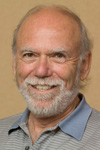Director's Corner
8 May 2008
 Barry Barish |
Third International Accelerator School for Linear Colliders: apply now
Recruiting and training the next generation of accelerator physicists is crucial to the future of the field. Accelerator schools play a central role in introducing potential accelerator experts to the science and in providing advanced education. Since the ILC has many very talented accelerator physicists working on some of the most challenging problems in accelerator physics, it is natural for us to sponsor and organise the schools that have themes that are close to our own research. The Global Design Effort has given priority to sponsoring and providing lecturers for two very successful schools, and we are now preparing for our "Third International Accelerator School for Linear Colliders," which will be held in Oak Brook, Illinois from 19-29 October 2008. The deadline for applications is 15 May. We encourage all interested and qualified students to apply for what I am confident will be a very rewarding experience.
 The Third International Accelerator School for Linear Colliders will take place in Oak Brook, Illinois. The Third International Accelerator School for Linear Colliders will take place in Oak Brook, Illinois. |
Accelerators and accelerator physics play an increasingly important role in many fields of science, including broader applications like medicine. But the development of accelerators and the training of accelerator physicists has historically been largely the domain of the worldwide particle physics community. R&D on new acceleration techniques and their application to future generations of particle accelerators have been and continue to be a central part of the research programmes of the major high energy physics laboratories and universities worldwide.
So how does a young researcher become an accelerator physicist and how do they receive their training? Only a few universities offer a PhD programme in accelerator physics, therefore accelerator physicists are generally converts from other fields of physics, such as from experimental particle physics. They develop an interest for or become involved in particle accelerators after receiving their PhD and by one route or another begin a conversion. The world's large particle physics laboratories generally provide encouragement and opportunities for young researchers to become involved in accelerator physics, for example through a chance involvement in the field and subsequent mentoring and, of course, many of our colleagues are autodidacts. Lastly, however, accelerator schools play a very important academic role.
 Two former linear collider students now doing research at the superconducting RF laboratory at Peking University. Two former linear collider students now doing research at the superconducting RF laboratory at Peking University. |
 Participants in the 2007 Erice linear collider accelerator school. Participants in the 2007 Erice linear collider accelerator school. |
The linear collider accelerator schools provide a brief but intensive academic experience. Our most recent school was in Erice in Sicily, Italy in October 2007, for which a class of 70 students was accepted from around the world from a pool of 243 applicants. Airfare and local support was provided to all students who accepted and attended the school. The curriculum for the school consisted of about a dozen lecturers teaching mini-courses on topics of their expertise. As for the school in October, the subjects cover most areas of accelerator physics for a large complex project like a linear collider. They include superconducting RF acceleration techniques, sources, beam dynamics, beam delivery and related topics. Students get homework assignments and a there is a final examination. We have seen that by participating in our school, students develop friendships, as well as receive important impulses for their career development.
For this year's school we expect a talented group of students from a similar applicant pool to the 2007 school. We will be adding lectures on muon colliders and room-temperature RF accelerator to the curriculum this year. We are particularly thankful to the DOE and Fermilab for providing support for this school during a time when U.S. funding for linear collider R&D has been curtailed. More generally, the school is supported in each region of the world to keep a regional balance among the students, and likewise, the lecturers come from the worldwide community. Although this activity takes several of our most talented and key accelerator physicists away from their busy lives working towards a linear collider, our support of these schools is something we give the highest importance.
The linear collider schools are sponsored jointly by the ILC GDE, ILCSC and ICFA Beam Dynamics Panel. We are particularly indebted to Weiren Chou of Fermilab and Shin-ichi Kurakowa of KEK, who have provided the inspiration and have done much of the hard work to make our schools a success.
-- Barry Barish